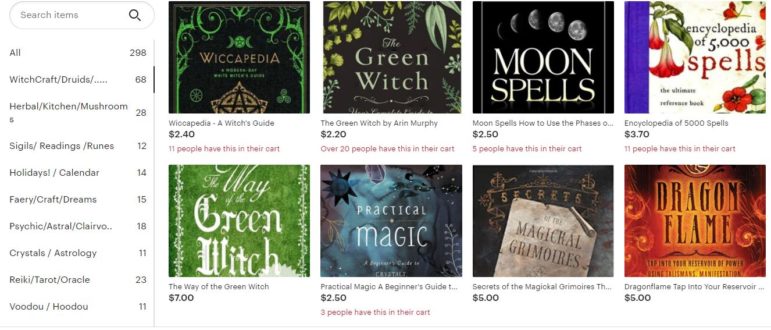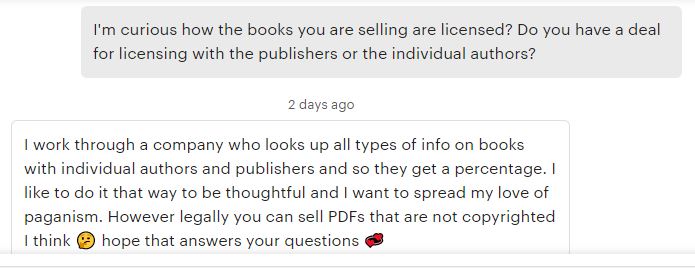TWH – On Sunday Michelle Belanger tweeted about an Etsy store that was selling file downloads of Pagan titles written by a variety of authors.
Hey, friends – if you have a book published through @WeiserBooks or @LlewellynBooks or pretty much anything witchy & occult, chances are this @Etsy shop is selling a pirated PDF of your book: https://t.co/siDlsEWntE
— M. Belanger (@sethanikeem) December 27, 2020
Etsy responded quickly and apparently shut down the store. But had it not been for Belanger’s surveillance, it’s not clear how long pirated products might have been sold.
The piracy of intellectual property is nothing new. Some estimates place the amount of revenue lost to piracy by the publishing industry as high as $300 million.
One of Belanger’s titles had been pirated and listed on the now-removed Etsy site. They said sites like this “undermine the entire process for smaller publishers and writers.”

Screenshot of White Owl Book Parlor Etsy store
It’s impossible to know the full impact of pirated books. The store shut down by Etsy, called White Owl Book Parlor, did not appear to have a substantial sales volume despite listing almost 300 book titles with prices ranging from US$2.40 to just over US$7.00 per PDF.
TWH contacted White Owl Book Parlor who denied wrongdoing.

The selling of copyrighted material is commercial piracy and may have penalties that include both financial and criminal consequences.
For an independent self-published author, the sale of a few books could nevertheless be significant. Piracy is not only a financial violation of one’s work but a personal one, and it affects all the relationships within the publishing value chain.
But the bottom line sales are only one part of the issue. Peter Turner, Associate Publisher for Red Wheel/Weiser, LLC, told TWH that the definition of piracy is also important. He said, “piracy of books is actually a somewhat confused and even controversial topic. It’s the obligation of the publisher to act on any serious violations of copyright.”
The financial impact of privacy is not entirely and immediately clear. Turner continued, “That said, the assumption that for every pirated download or resale there is a loss of a legitimate sale (and royalty paid to the author) is just that, an assumption. Obviously, that’s not something one could determine though publishers have tried. One large publisher did a study years back and apparently, there was evidence that pirated downloads actually helped legit sales.”
But it is still a violation and a widespread activity. Kat Neff, Senior Publicist for Llewellyn Worldwide told TWH that they had received enough complaints regarding pirated books that they now have a page on their website where copyright infringement can be reported. The page also includes email links for notifying Lo Scarabeo and Blue Angel Publishing, who publish tarot and oracle cards and other related items.
Neff said that “Llewellyn tends to deal with reported issues of piracy pretty quickly and issuing a take down order is usually effective.” In the case of White Owl Book Parlor, by the time Neff was notified, the site was already down and required no action on Llewellyn’s part.
Neff underscored unequivocally, that these illegal sellers are “taking food out of authors’ mouths.”
Turner emphasized that “People need to understand that when books are acquired in this way, authors miss out on their royalty and publishers lose revenue. And apart from this, people should be very careful when seeking out free downloads.”
Turner points out that few things are free. “There are also all sorts of scams involved online. Some are just phishing for email addresses. Others are sites trying to hack credit card info, etc. Free content is one way that these sorts of sites attract traffic,” he said.
Publishing Income
In general, the act of writing a book is a labor of love. The amount of income an author can make from a book is commonly overestimated. Most authors have other employment for a stable income. According to a report released by the Author’s Guild in February, about half of all full-time authors fell below the $12,488 poverty threshold for income in 2019.
The majority of authors revenue relatively little from the process, with most routinely earning 6% to 12.5% of net sales depending on the format. The percentage of revenue from e-books is often higher.
If an author receives a rare advance for their work, the revenue related to book sales is first deducted from the royalties until the advance is paid. The percentage of revenue fractionally increases if a book enters multiple editions.
Authors can earn through other sources. Within the Pagan community, authors attend events, teach classes, and even sell merchandise to supplement their income and continue writing about their spirituality.
Preventing Piracy and Community Support
Belanger pointed out that, in their experience, anytime you see a site offering books for sale in the form of a PDF, it is almost certainly a pirated text. They said this about PDF’s, “It’s simply not a format used for resale & book distribution within the publishing industry particularly because it is so easy to redistribute.”
Belanger also noted that even their own publishers don’t like giving them PDF copies of their own work once the book has reached its final form – not even for reviews. Neff said that she sends out PDF galleys occasionally, but that it is actually less expensive to mail a physical copy.
Neff stressed that authors really need the support of their communities, especially now. The loss of festivals and conferences within the Pagan sphere has decimated the income of many Pagan writers and artists.
“It boils down to support from the community, supporting authors and the bookstores that carry their books. Authors really need our help. The loss of events… if you can’t travel, you can’t promote your book,” Neff said.
Belanger echoed similar thoughts and took it a step further. They said, “If you are interested in an author’s work, buy directly from them if you can.”
Belanger did think buyers should understand how illegal sales of intellectual property can impact writers who are already likely to earn little from their work. But they did not feel it was productive to shame buyers who have bought pirated material. Belanger suggested that buyer education is important. A well-informed community can have a tremendous impact on stopping piracy.
The Wild Hunt is not responsible for links to external content.
To join a conversation on this post:
Visit our The Wild Hunt subreddit! Point your favorite browser to https://www.reddit.com/r/The_Wild_Hunt_News/, then click “JOIN”. Make sure to click the bell, too, to be notified of new articles posted to our subreddit.